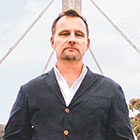
The Paradigm Project: Practicing Uncommon Sense to Save Lives and the Environment
In the competitive space of philanthropy and philanthrocapitalism, how do you break through the clutter and get people engaged in an issue that isn’t the tug-on-your-heart-strings norm?
This week, The Paradigm Project hopes to do just that by starting a conversation about fuel-efficient cook stoves. They hope to bring to light the issues that women in many parts of Africa face each day walking up to 15 miles to find wood to cook food, with their live WoodWalk campaign. It’s a 10-day walk from San Diego to Los Angeles (October 4–13, 2011) during which a team of founders, staff, partners, and volunteers are carrying 50-pound bundles of wood on their backs replicating the trials and challenges of the women they’re working to help. At the finish line in Los Angeles on October 13th, they will construct an “African cooking experience” complete with a traditional Kenyan hut that they’ll also be cooking in along the way. Visitors will have an opportunity to step inside and experience the smoky hut, which is equal to smoking 40 cigarettes per day.
The Paradigm Project is utilizing five uncommon sense principles to get in front of the people whose help they need to create permanent change:
1. Seek the truth first.
About 3 billion people around the world are subject to open-fire cooking every day, which means forests are disappearing, women and children are dying from smoke inhalation, and families are spending vast amounts of time and money just to cook. Open fire cooking causes respiratory disease, economic instability, and immeasurable destruction of natural resources.
The problem is obvious, but the solution is not. It may seem easiest to start a charity and collect donations to then donate stoves to the women in need. But the founders of The Paradigm Project studied other organizations who had pursued that path and saw issues with the lack of business and infrastructure to support the continued use of these stoves, as well as the lack of commitment from owners if the product was donated, versus being purchased at a subsidized rate. Instead, they have carefully crafted a business model that sells clean-burning and efficient “rocket stoves” that are connected to the carbon markets. The use of efficient cook stoves reduces emissions, which in turn generates carbon credits that are sold through European and U.S.-based carbon markets. Proceeds from these sales create a self-sustaining mechanism that ultimately eliminates the need for continued outside funding. Surplus proceeds support other community projects such as clean water, health clinics, and schools at the discretion of the community.
2. Operate courageously and with conviction.
From the time the idea for The Paradigm Project originated more than five years ago to today, the founders have put their lives on the line numerous times and have literally blown their comfort zone out the window. They mapped out their goals (5 million stoves by 2020), the benchmarks they needed to reach to get there, and then they got to work. Greg Spencer Sr. and Greg Spencer Jr., two of the founders, traveled to Kenya to experience and document the daily habits of the women there and were ridiculed by men who couldn’t fathom why these two men were doing “women’s work.” Fast-forward to this week, they are risking their health, cartilage, and spines carrying 50-pound bundles of wood for 10 straight days along the Southern California coast to bring the issue to life at the doorsteps of those who can help make change. Armed with a clear vision of the change they are going to make in the world, their commitment and optimism never waver.
3. Remember, people change the world.
While our society tends to rate stoves lower on the list of issues that are important to support, smoke inhalation kills more than 1.6 million people every year, with women and children in the disproportionate majority, and is the number one killer of children under the age of five (more than AIDS, malaria, malnutrition, and water-borne disease). This is a problem that isn’t going to solve itself, and The Paradigm Project has boldly stepped up to tackle the issue. In their first year of business, they were projected to implement 10,000 stoves by the end of the 2011, but have already more than tripled that target and are slated to reach 60,000 stoves this year.
4. Bold is admirable, but humility is sexy.
Greg Spencer Jr. had a bold vision for the WoodWalk, and attacked the problem with confidence and humility, which is exemplified in his blog post from the second day of the WoodWalk,
“It’s all about perspective. We have a choice in doing this WoodWalk, we have a choice to eat where we want to and spend time doing what we want to with the people we want to. The reality for so many people in the developing world is that they have no choice. They didn’t choose to be born into poverty, or disease, or orphanage and many don’t even get to choose whether or not they go to school. But this shouldn’t cause guilt or pity for the people that don’t have choice, it should cause compassion and empathy and respect because most of us here have no idea what it’s like to not have choice. I’m not here to preach, but to try and share the story of what women go through all around the world just to cook and what we at The Paradigm Project are working to do to change that.”
5. Results count.
The Paradigm Project has made its mission to create a compelling experience with the WoodWalk, while engaging the local community to take action and assist in raising funds as the organization develops their work in East Africa. With these necessary elements, The Paradigm Project hopes to end open-fire cooking for 25 million people by implementing more than 5 million fuel-efficient rocket stoves before 2020.
You can learn more about the issue and The Paradigm Project’s proposed solution, which has been recognized twice by the Clinton Global Initiative, here. You can also learn more about the WoodWalk or find out how to get involved here.


Uncommon Person: Chad Hutson

Our Internal Learning & Impact at Bulldog Drummond

The One Decision by Employers in 2021 that Means Everything

What I Wish I Knew

Standing Up Inside

Uncommon Person: Gregg Imamoto

Five Things Every Company Should Know about ESG

Redefining Value

Uncommon Person: Chris Baréz-Brown

It’s Time For A Whole Lotta Common Good

Did You Choose Humanity?

Uncommon Partnership: Violux

Here’s How

Uncommon Person: Santhosh Nair

Designing Strategy For A Complex World

Responsibility & Relevance for Brands

